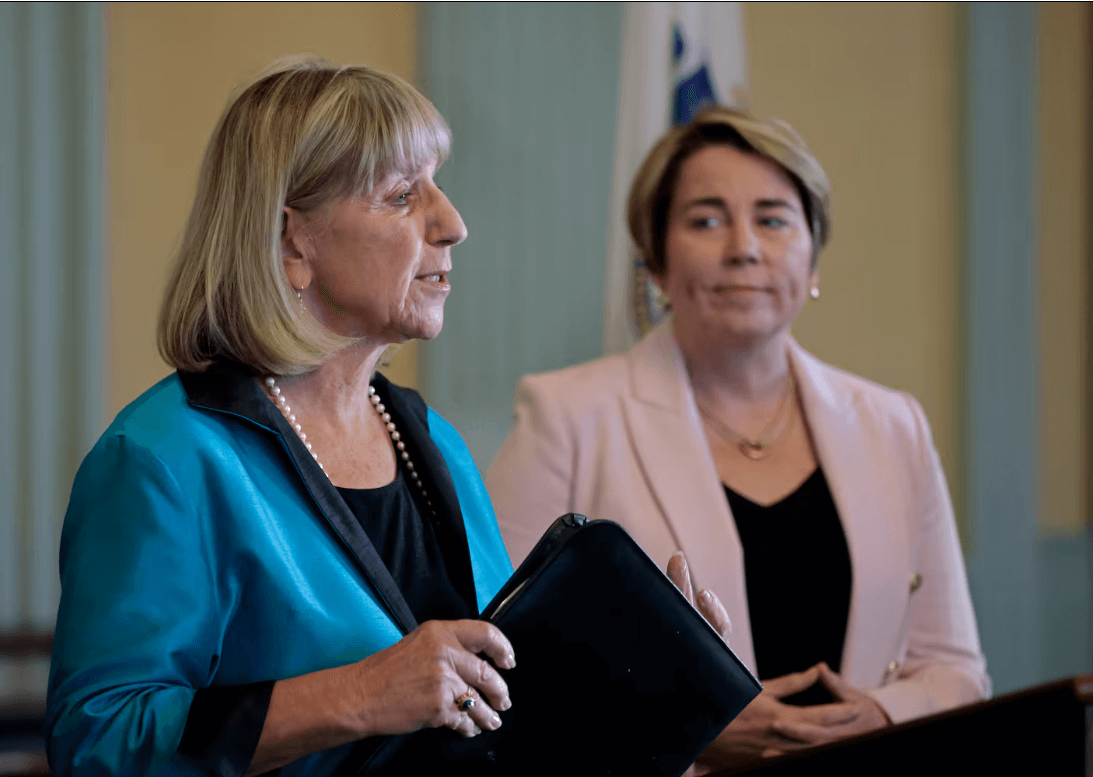全国的民主党州议会已经开始向特朗普发起挑战。马萨诸塞州的情况如何?

【中美创新时报2025 年 3 月 30 日编译讯】(记者温友平编译)由于白宫和国会都掌握在共和党手中,特朗普总统的反对者们依靠州民主党人来抵制其政府的政策变化。从加利福尼亚州到康涅狄格州,民主党占多数的州立法机构都通过了反对行政命令猛烈攻击的决议,并拨出资金来填补预期的缺口。马萨诸塞州的情况如何?《波士顿环球报》记者安贾利·黄对此作了下述报道。
由于白宫和国会都掌握在共和党手中,特朗普总统的反对者们依靠州民主党人来抵制其政府的政策变化。从加利福尼亚州到康涅狄格州,民主党占多数的州立法机构都通过了反对行政命令猛烈攻击的决议,并拨出资金来填补预期的缺口。
但在马萨诸塞州,民主党在两院都占有绝对多数,州议员们 在协调公众反应方面采取了更从容的方式。这引起了一些选民和左翼支持者的批评,其中包括 15 个进步组织,他们上周致信敦促领导人加快立法进程,抵制特朗普的议程。
帮助组织这封信的政府监督组织 Act on Mass 的执行董事斯科舍·希尔 (Scotia Hille) 说:“每个人都在玩热土豆游戏,争论谁应该为我们州对联邦政府的回应负责。”
“我已经习惯了立法机关的不作为,”希勒继续说道,并指出上一次会议进展缓慢。“但考虑到我们面临的危机程度以及大胆领导在此刻的绝对重要性……我很惊讶他们仍然保持着同样的时间表。”
情况并非总是如此。2017 年,特朗普首次担任总统两周后,马萨诸塞州参议院通过了一项决议,反对他对部分移民的旅行禁令。一个月后,时任众议院议长罗伯特·德利奥成立了一个工作组——由现任议长罗恩·马里亚诺共同领导——以应对特朗普政府的“前所未有的行动”。
在特朗普第二届政府执政期间,民主党控制的州已经采取措施,抵制全面的政策变化。
加州州长加文·纽瑟姆在特朗普就职前召集州议会召开特别会议;他们随后批准拨款5000万美元用于防御特朗普政府的政策。
在科罗拉多州,州立法者通过一项决议,谴责特朗普于2021年1月6日赦免国会大厦暴徒的行为。
在康涅狄格州,立法者通过了一项紧急法案,为特朗普政府针对的组织提供资金,例如计划生育协会和难民安置机构。
自 1 月 1 日马萨诸塞州立法机构开始会议以来,立法者已经通过了一项为紧急避难所系统提供资金的补充预算,并开始制定旨在提高透明度的规则。但到目前为止,他们还没有正式谴责政府的举动,也 没有提出旨在帮助受特朗普行为影响的居民的法案。
立法领导人表示,特朗普的一系列行政命令以及哪些命令将持续生效的不确定性使得立法机构难以做出回应。法院阻止了总统终止部分美国出生居民的出生公民权、冻结联邦资金以及限制未成年人变性治疗的努力。然而,从削减高等教育机构的资金到持续的大规模驱逐出境等其他变化继续让一些马萨诸塞州居民感到担忧。特朗普政府已经表示,它可能会进一步针对与之有分歧的州,例如缅因州。
马里亚诺告诉《波士顿环球报》,在特朗普的第二任期内,“他能掌控的范围”已经扩大,他说,“每天都有新变化。”此前,他在马萨诸塞州生物医学会议上表达了对政府削减公共卫生研究资金的担忧。
“我们不知道这一切会如何发展,直到它真正实现,”马里亚诺说。“我们无法制定预算——我们只是在黑暗中摸索,这真是太令人沮丧了。”
相比之下,马萨诸塞州全民主党国会代表团的成员在市政厅举行会议,批评不受欢迎的共和党政策并回应选民的不满。司法部长安德里亚·坎贝尔 (Andrea Campbell) 已加入针对特朗普政府的几起诉讼。波士顿市长吴弭 (Michelle Wu)本月出席国会听证会,因有力捍卫波士顿的安全和移民政策而赢得左翼人士的赞扬。
州长莫拉·希利 (Maura Healey) 则越来越多地强调特朗普的行动(例如关税)可能会损害马萨诸塞州居民的利益。
与此同时,一些城市找到了其他方法来挑战特朗普的举措。波士顿、皮茨菲尔德和伍斯特都通过了法案,宣布自己 是跨性别者的庇护城市——这是对特朗普政府削减 LGBTQ 保护的回应。
上周,当被问及立法机构将如何回应时,参议院议长凯伦·斯皮尔卡回答道:“我们要对什么采取行动?”她称特朗普的各种变化“冷酷无情、残酷无情,简直令人作呕”,并表示她听说她所在选区的退伍军人在退伍军人事务部裁员后难以获得福利。
“大部分的伤口都在那里,然后就消失了——就像鞭伤一样,不仅在同一周或一天内,而且在一小时内就消失了,”斯皮尔卡说。“这可能是他的策略,淹没整个区域,让人很难知道什么是真实的,什么是虚假的。”
斯皮尔卡表示,像立法机关过去所做的那样采取决议“可能是我们的选择”。
她补充道:“我们正在谈判并努力解决问题,但我们无法恢复退伍军人服务,无法恢复联邦教育部,所以我们需要看到一些具体的事情。”
然而,一些人认为这种回应还不够。随着民主党面临几十年来最低的支持率,许多民主党官员面临着居民的批评,他们对民主党领导人无法有力地反对特朗普的举动感到愤怒。在马萨诸塞州,反特朗普的情绪高涨:数千人抗议政府效率部打击移民和削减开支。
马萨诸塞州塞拉俱乐部主任维卡什·莫汉卡说:“发生了很多事,很难跟踪,但这就是领导人的工作——领导人的工作就是对此作出反应,并确保有人负责保护国家。”
“我们希望看到政府采取行动,更加积极主动,采取更果断的立场,”莫汉卡补充道,并指出他的组织因担心移民突击检查而取消了一些活动。“我希望他们向美国展示什么是可能的。”
一些立法者也认为立法机关的反应过于迟缓。
萨默维尔民主党众议员埃里卡·乌特霍芬 (Erika Uyterhoeven) 表示:“人们现在渴望领导力……我们需要与他们相匹配的斗争和精力。”
“我们必须未雨绸缪。尽管白宫发生的事情存在很多不确定性,但我们现在了解他们的策略了,”乌伊特霍文补充道,他指的是特朗普第二任期保守派政策蓝图“2025 项目”。“作为一个州,我们如何领先于此至关重要,因为即使这些事情还没有成为头条新闻,但它们终究会成为头条新闻。”
本月,在马萨诸塞州州议会大厦举行的马萨诸塞州“移民日”活动上,一些议员大力宣传旨在保护移民的立法,例如“安全社区法案”,该法案将禁止马萨诸塞州警察和法院询问某人的移民身份。该法案自前总统巴拉克·奥巴马执政以来就已提出,但尚未通过,因为“情况并不那么紧迫”,该法案的发起人、马尔伯勒民主党参议员杰米·埃尔德里奇 (Jamie Eldridge) 说。
“我确实认为我们需要做更多,” 埃尔德里奇说。“但事情发生得太快了……这是特朗普政府故意为之,目的是麻痹人们,让他们放慢脚步,因为我们仍在从三天前的灾难中恢复过来。”
前州众议员帕特里夏·哈达德(Patricia Haddad)曾于 2017 年与马里亚诺一起担任以特朗普为重点的工作组主席,并于去年秋天在竞选连任中败给了共和党人。哈达德表示,她的前同事们正在“做他们必须做的事情”,专注于预算;他们的首要任务应该是确保“社区感受到支持,我们的部门感到他们可以继续履行职责”。
“我所有的朋友都在努力让他们的选民感觉一切都会好起来,”哈达德说。“但最终,我们虽然了解得更多了,但我们还是处于同样的境地。我们不知道明天会发生什么。”
题图:参议院议长凯伦·斯皮尔卡 (Karen Spilka) 去年秋天与州长莫拉·希利 (Maura Healey) 表示,立法机构可能会通过决议来反对特朗普政府的政策,就像总统第一任期期间所做的那样。Pat Greenhouse/Globe 员工
附原英文报道:
Democratic state legislatures nationwide have started to take on Trump. What about Massachusetts?
By Anjali Huynh Globe Staff,Updated March 30, 2025, 9:12 a.m.
Senate President Karen Spilka, with Governor Maura Healey last fall, says the Legislature may take up resolutions to counter Trump administration policies, as it did during the president’s first term. Pat Greenhouse/Globe Staff
With the White House and Congress in Republicans’ hands, President Trump’s opponents have relied on state Democrats to defend against his administration’s policy changes. From California to Connecticut, state legislatures with Democratic majorities have passed resolutions opposing the onslaught of executive orders and allocated funds to fill expected gaps.
But here in Massachusetts, where Democrats hold supermajorities in both chambers, state lawmakers have taken a more leisurely approach to coordinating a public response. That has prompted criticism from some voters and advocates on the left, including 15 progressive organizations that sent a letter last week urging leaders to take up lawmaking more quickly and push back on Trump’s agenda.
“Everyone’s kind of playing hot potato with who’s responsible for our state response to the federal administration,” said Scotia Hille, executive director of Act on Mass, a government watchdog group that helped organize the letter.
“I am used to inaction from the Legislature,” Hille continued, pointing to the previous slow-moving session. “But given the extent of the crisis that we’re facing and the absolute importance of bold leadership in this moment … I am surprised they have kept the same old timeline.”
It wasn’t always this way. In 2017, two weeks into Trump’s first presidency, the Massachusetts Senate passed a resolution opposing his travel ban against some immigrants. A month later, then-House Speaker Robert DeLeo created a working group — co-led by now-Speaker Ron Mariano — that would address the Trump administration’s “unprecedented actions.”
In Trump’s second administration, Democratic-controlled states have already taken steps to fight sweeping policy changes.
California Governor Gavin Newsom convened the state Assembly for a special session before Trump’s inauguration; they’ve since approved $50 million to defend against Trump administration policies.
In Colorado, state legislators passed a resolution condemning Trump’s pardons of rioters at the Capitol on Jan. 6, 2021.
And in Connecticut, lawmakers passed an emergency bill funding groups targeted by the Trump administration, such as Planned Parenthood and refugee settlement agencies.
Since the Massachusetts Legislature began its session Jan. 1, lawmakers have passed a supplemental budget funding the emergency shelter system and begun creating rules aimed at improving transparency. But so far, they have not officially condemned the administration’s moves or taken up bills aimed at helping residents affected by Trump’s actions.
Legislative leaders say Trump’s barrage of executive orders, and ongoing uncertainty about which will hold, has made it difficult to respond. Courts have blocked the president’s efforts to end birthright citizenship for some American-born residents, freeze federal funds, and restrict gender transition treatments for minors. Other changes, however, from funding cuts to higher education institutions to ongoing mass deportations, have continued to worry some Massachusetts residents. And the Trump administration has already indicated it may further target states it spars with, such as Maine.
Mariano told the Globe that in Trump’s second term, the “expanse of what he’s got his hands on” has grown, saying, “Every day is something different.” The speaker’s remarks came after he voiced concerns at a MassBio conference about the administration cutting funds for public health research.
“We don’t know where it all is going to land until it lands,” Mariano said. “We can’t make a budget — we’re just shooting in the dark, and it’s frustrating as hell.”
By contrast, members of Massachusetts’ all-Democratic congressional delegation have held town halls criticizing unpopular Republican policies and responding to frustration among constituents. Attorney General Andrea Campbell has joined several lawsuits against the Trump administration. Boston Mayor Michelle Wu appeared before Congress this month, earning praise among the left for forcefully defending Boston’s safety and immigration policies.
Governor Maura Healey, for her part, has increasingly highlighted how Trump’s actions, such as tariffs, could hurt Massachusetts residents.
Some cities, meanwhile, have found other ways to challenge Trump’s moves. Boston, Pittsfield, and Worcester have all passed measures declaring themselves to be sanctuary cities for transgender people — a response to the Trump administration’s efforts to roll back LGBTQ protections.
Asked last week how the Legislature could respond, Senate President Karen Spilka replied, “What do we take action on?” She called the variety of Trump’s changes “cold-hearted, cruel, and just disgusting,” saying she had heard from veterans in her district, for example, struggling to access benefits following layoffs at the Department of Veterans Affairs.
“Most of the cuts are there, then they disappear — it’s like whiplash within not only the same week or day, but within an hour,” Spilka said. “This is probably his strategy, to flood the zone and make it so it’s hard to know what’s real and what’s not real.”
Spilka said taking up resolutions, as the Legislature has done in the past “may be an avenue we will go.”
“We are talking and we’re working on issues, but we can’t restore the veterans services, we can’t restore the federal Department of Education, so we need to see some concrete things,” she added.
Some, however, say that response isn’t enough. As the Democratic Party faces its lowest approval ratings in decades, many Democratic officials have faced criticism from residents angered by their leaders’ inability to forcefully counter Trump’s moves. In Massachusetts, anti-Trump energy has swelled: Thousands have protested immigration crackdowns and cuts by the Department of Government Efficiency.
“There’s a lot happening, it’s hard to keep track of, but this is what the job is for leaders — it’s leaders’ jobs to respond to it and make sure there is someone responsible in charge who’s going to protect the state,” said Vickash Mohanka, director of the Massachusetts Sierra Club.
“We would love to see the state just do something, be more active, and take more decisive stances,” Mohanka added, noting that his organization had canceled some events out of fear of immigration raids. “I would like them to show the U.S. what is possible.”
Some lawmakers, too, feel the Legislature has been slow to react.
“People are hungry for leadership right now … we need to be matching their fight and matching their energy,“ said state Representative Erika Uyterhoeven, a Somerville Democrat.
“We just have to think ahead. As much as there’s a lot of uncertainty around what’s happening in the White House, we understand their playbook now,” Uyterhoeven added, pointing to Project 2025, the conservative policy blueprint for Trump’s second term. “How we get ahead of that as a state is so critical because even though these things aren’t in the headlines yet, they’re going to be.”
At Massachusetts’ “Immigrants Day” at the State House this month, some lawmakers touted legislation aimed at protecting immigrants such as the “Safe Communities Act,” a bill that would prevent Massachusetts police officers and courts from questioning someone about their immigration status. The legislation has been proposed since former president Barack Obama was in office but hadn’t passed because there “wasn’t as much of an urgency,” said state Senator Jamie Eldridge, a Marlborough Democrat who sponsored the bill.
“I do think we need to do more,” Eldridge said. “But things are happening so quickly … it is by design, by the Trump administration, to numb people, to sort of get them to slow down because we’re still recovering from what happened three days ago.”
Former state Representative Patricia Haddad, who chaired the Trump-focused working group alongside Mariano in 2017 and lost her re-election bid to a Republican last fall, said her former colleagues are “doing what they have to do” in focusing on the budget; their priority should be ensuring “communities feel supported and our departments feel like they can continue to perform their duties.”
“All my friends are out trying to make their constituents feel like it’s going to be OK,” Haddad said. “But at the end of the day, we have a little more knowledge, but we’re in the same place. We don’t know what’s happening tomorrow.”

